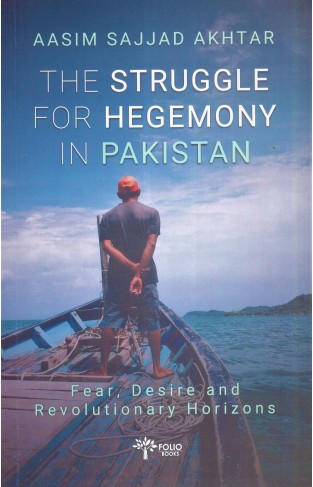- Home
- Books
- Categories
- Non Fiction
- Education and Reference
- The Struggle for Hegemony in Pakistan Fear, Desire and Revolutionary Horizons
The Struggle for Hegemony in Pakistan Fear, Desire and Revolutionary Horizons
By: Aasim Sajjad Akhtar
-
Rs 765.00
- Rs 850.00
- 10%
You save Rs 85.00.
Due to constant currency fluctuation, prices are subject to change with or without notice.
The collapse of neoliberal hegemony in the western world following the financial crash of 2007-8 and subsequent rise of right-wing authoritarian personalities has been described as a crisis of 'the political' in western societies. But the crisis must be seen as global, rather than focusing on the west alone.
Pakistan is experiencing rapid financialisation and rapacious capture of natural resources, overseen by the country's military establishment and state bureaucracy. Under their watch, trading and manufacturing interests, property developers and a plethora of mafias have monopolised the provision of basic needs like housing, water and food, whilst also feeding conspicuous consumption by a captive middle-class.
Aasim Sajjad-Akhtar explores neoliberal Pakistan, looking at digital technology in enhancing mass surveillance, commodification and atomisation, as well as resistance to the state and capital. Presenting a new interpretation of our global political-economic moment, he argues for an emancipatory political horizon embodied by the 'classless' subject.
The collapse of neoliberal hegemony in the western world following the financial crash of 2007-8 and subsequent rise of right-wing authoritarian personalities has been described as a crisis of 'the political' in western societies. But the crisis must be seen as global, rather than focusing on the west alone.
Pakistan is experiencing rapid financialisation and rapacious capture of natural resources, overseen by the country's military establishment and state bureaucracy. Under their watch, trading and manufacturing interests, property developers and a plethora of mafias have monopolised the provision of basic needs like housing, water and food, whilst also feeding conspicuous consumption by a captive middle-class.
Aasim Sajjad-Akhtar explores neoliberal Pakistan, looking at digital technology in enhancing mass surveillance, commodification and atomisation, as well as resistance to the state and capital. Presenting a new interpretation of our global political-economic moment, he argues for an emancipatory political horizon embodied by the 'classless' subject.
The Struggle for Hegemony in Pakistan Fear, Desire and Revolutionary Horizons
By: Aasim Sajjad Akhtar
Rs 765.00 Rs 850.00 Ex Tax :Rs 765.00
Zubin Mehta: A Musical Journey (An Authorized Biography)
By: VOID - Bakhtiar K. Dadabhoy
Rs 472.50 Rs 1,050.00 Ex Tax :Rs 472.50
History's People: Personalities and the Past
By: Margaret MacMillan
Rs 877.25 Rs 1,595.00 Ex Tax :Rs 877.25
Makers Of The Muslim World: Abd Al Malik - (PB)
By: Chase F. Robinson
Rs 357.75 Rs 795.00 Ex Tax :Rs 357.75
Viva Dictionary Of Punctuation And Hyphenation
By: William Gould
Rs 135.00 Rs 150.00 Ex Tax :Rs 135.00
And Another Thing... (The Hitchhiker's Guide to the Galaxy)
By: Eoin Colfer
Rs 355.50 Rs 395.00 Ex Tax :Rs 355.50
Collins Pocket Italian Dictionary
By: Collins Dictionaries
Rs 1,491.75 Rs 2,295.00 Ex Tax :Rs 1,491.75
History's People: Personalities and the Past
By: Margaret MacMillan
Rs 877.25 Rs 1,595.00 Ex Tax :Rs 877.25
Makers Of The Muslim World: Abd Al Malik - (PB)
By: Chase F. Robinson
Rs 357.75 Rs 795.00 Ex Tax :Rs 357.75
No recently viewed books available at the moment.
Zubin Mehta: A Musical Journey (An Authorized Biography)
By: VOID - Bakhtiar K. Dadabhoy
Rs 472.50 Rs 1,050.00 Ex Tax :Rs 472.50
The Struggle for Hegemony in Pakistan Fear, Desire and Revolutionary Horizons
By: Aasim Sajjad Akhtar
Rs 765.00 Rs 850.00 Ex Tax :Rs 765.00
History's People: Personalities and the Past
By: Margaret MacMillan
Rs 877.25 Rs 1,595.00 Ex Tax :Rs 877.25
Makers Of The Muslim World: Abd Al Malik - (PB)
By: Chase F. Robinson
Rs 357.75 Rs 795.00 Ex Tax :Rs 357.75














-120x187.jpg?q6)






-120x187.jpg?q6)












